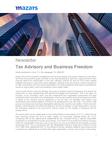
Tax Advisory and Business Freedom
Article 333 of the Constitution establishes that economic activity and private initiative are free within the limits of the common good, and that no one may demand prior permits or requirements for their exercise without the authorization of the law. Likewise, Articles 25 and 26 of the same statute establish that work is a right and a social obligation, and that everyone is free to choose a profession or trade, and that the law may require qualifications for those professions that require a professional license or authorization, given the sensitivity of the subject matter.
As the world and the economy develop, the areas of practice become transversal and require the intervention of many professionals with different knowledge and experience. This is the case, for example, of tax consulting, which has two fundamental and inseparable components; the legal component (which is based on the interpretation of the tax law) and the accounting component (which is based on the financial and tax application of the tax law). For decades, both lawyers and accountants have worked together to achieve the development of tax law and, in this sense, both groups of professionals have been dedicated to advising their clients on tax matters. That is why both groups of professionals are linked and belong to the same colleges or trade associations, such as the Colombian Institute of Tax Law (ICDT) and the Center for Tax Studies of Antioquia (CETA), among others.
The above seems to be a dead letter for the Central Board of Accountants ("J.C.C."), entity that has been requiring several law firms to either register as accounting societies before the J.C.C. (complying with all the requirements established by law, including having a special shareholder composition of at least 80% of public accountants), or to refrain from providing tax advisory services, under the interpretation that such area of services can only be provided by accountants or public accounting firms. This, in accordance with the interpretation that such entity has of Article 2 of Law 43 of 1990, which establishes that "For the effects of this law, activities related to accounting science in general are understood as all those that imply organization, revision and control of accounting, certifications and reports (...) as well as all those activities related to the nature of the professional function of Public Accountant, such as: tax advice, management advice in accounting aspects and similar".
Due to the seriousness of the matter, it is important to transcribe verbatim one of such requirements, as follows: "(...) I indicate that the legal entity you represent, registers activities that are considered proper and inherent to the accounting science, in accordance with the provisions of Article 2 of Law 43 of 1990, as evidenced in the certificate of Existence and Legal Representation and in the Certificate of Commercial Registration, issued by the Chamber of Commerce, for which it must have the prior registration before this entity, through the registration and issuance of the Registration Card, as expressly stipulated in the legal framework governing the accounting profession.
Based on the foregoing, this entity provides a term of twenty (20) business days (...) to comply with the provisions of Article 2 of Decree 1510 of 1998 or otherwise proceed to exclude from its corporate purpose and its registration of activities before the Chamber of Commerce, those inherent to the accounting science".
The above could not be more serious, unfair and inequitable because it would be excluding a group of professionals from an economic activity that they know how to do and that, by doing it, benefits the business community and therefore the country.
Likewise, it opens the dangerous door to interpret that those who give tax advice to clients without being accountants or through professional firms not registered before the J.C.C. as accounting firms, would be incurring in acts of unfair competition by violation of Article 18 of Law 256 of 1996, in the sense of acquiring a competitive advantage in the market through the infringement of a legal rule.
It is essential to promote an action of unconstitutionality against this rule, which flagrantly violates the constitutional right to freedom of enterprise.


